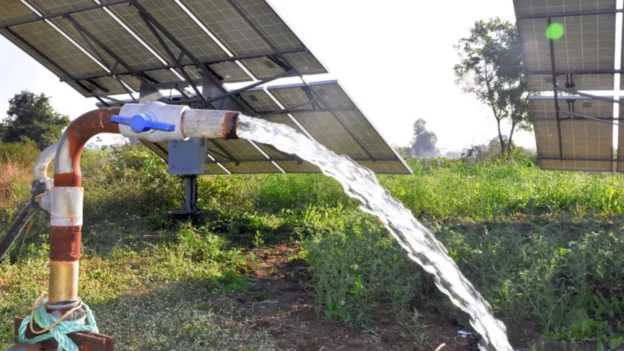ABB launches an innovative solar converter called ACQ80 , designed to optimize sustainable water pumping.
Solutions for carbon dioxide emissions
The development of technological solutions for water pumping powered by solar photovoltaic (PV) energy is gaining greater relevance globally, due to its ability to significantly reduce carbon dioxide emissions associated with pumping operations. These systems are vital, especially in remote areas where connection to the electrical grid is non-existent and where it is essential to ensure a constant supply of water for applications such as agricultural irrigation, water supply for livestock and human consumption.
ABB’s latest innovation, the ACQ80 solar pump converter , has been designed to address these needs, facilitating highly efficient and ecological pumping operations by harnessing solar energy . This device stands out for its ability to maintain optimal operation with minimal carbon emissions .
How does the solar converter work?
The ACQ80 launched by ABB is distinguished by incorporating advanced maximum power point tracking (MPPT) logic. This functionality is complemented by its ability to handle a wide spectrum of input voltages, ranging from 225 to 800 VDC.
This feature allows the converter to keep the pump motor running, even during periods of low solar irradiation. Compared to traditional converters, the ACQ80 offers an extended operating period, thus maximizing the amount of water pumped under various atmospheric and lighting conditions.
Future perspectives in solar pumping technology
With the increase in the adoption of renewable technologies, Converters like the ACQ80 represent just the beginning of what could be a revolution in water management infrastructure. Looking to the future, it is possible to anticipate the development of even more efficient and adaptive systems, which manage water pumping and integrate real-time monitoring and system diagnosis capabilities to further optimize the use of water and energy resources in agricultural contexts. and industrial.
These innovations will promote environmental sustainability, as well as improve the economic efficiency of agricultural and water management operations globally.
Follow us on social networks and don’t miss any of our publications!
Inspenet.com YouTube LinkedIn Facebook Instagram X
Source: elperiodicodelaenergia.com
Photo: Shutterstock

